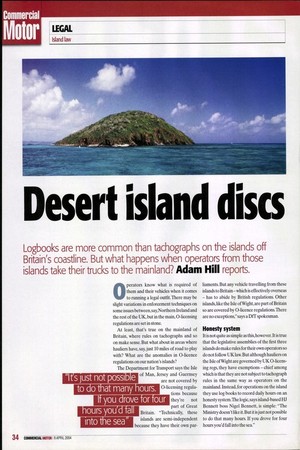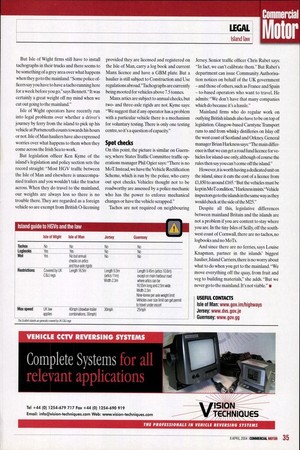Desert island discs
Page 34

Page 35

If you've noticed an error in this article please click here to report it so we can fix it.
Logbooks are more common than tachographs on the islands off Britain's coastline. But what happens when operators from those
islands take their trucks to the mainland? Adam Hill reports.
perators know what is required of them and their vehicles when it comes to running a legal outfit. There may be slight variations in enforcement techniques on some issues between,say, Northern Ireland and the rest of the UK, but in the main, 0-licensing regulations are set in stone.
At least, that's true on the mainland of Britain, where rules on tachographs and so on make sense. But what about in areas where hauliers have, say, just 10 miles of road to play with? What are the anomalies in 0-licence regulations on our nation's islands? The Department for Transport says the Isle of Man, Jersey and Guernsey are not covered by 0-licensing regulations because they're not part of Great Britain. "Technically, these islands are semi-independent because they have their own par
liaments. But any vehicle travelling from these islands to Britain—which is effectively overseas — has to abide by British regulations. Other islands, like the Isle of Wight, are part of Britain so are covered by 0-licence regulations. There are no exceptions," says a DfT spokesman. Honesty system
It is not quite as simple as this, however. It is true that the legislative assemblies of the first three islands do make rules for their own operators so do not follow UK law. But although hauliers on the Isle of Wight are governed by UK 0-licensing regs, they have exemptions — chief among which is that they are not subject to tachograph rules in the same way as operators on the mainland. Instead, for operations on the island they use log books to record daily hours on an honesty system.The logic, says island-based HJ Bennett boss Nigel Bennett, is simple: "The Ministry doesn't like it. But it is just not possible to do that many hours. If you drove for four hours you'd fall into the sea."
But Isle of Wight firms still have to install tachographs in their trucks and there seems to be something of a grey area over what happens when they go to the mainland."Some police officers say you have to have a tacho running here for a week before you go," says Bennett."It was certainly a great weight off my mind when we cut out going to the mainland."
Isle of Wight operators have recently run into legal problems over whether a driver's journey by ferry from the island to pick up his vehicle at Portsmouth counts towards his hours or not. Isle of Man hauliers have also expressed worries over what happens to them when they come across the Irish Sea to work. But legislation officer Ken Kyme of the island's legislation and policy section sets the record straight: "Most HGV traffic between the Isle of Man and elsewhere is unaccompanied trailers and you wouldn't take the tractor across. When they do travel to the mainland, our weights are always less so there is no trouble there. They are regarded as a foreign vehicle so are exempt from British 0-licensing
provided they are licensed and registered on the Isle of Man, carry a log book and current Manx licence and have a GBM plate. But a haulier is still subject to Construction and Use regulations abroad."Tachographs are currently being mooted for vehicles above 7.5 tonnes.
Manx artics are subject to annual checks, but twoand three-axle rigids are not. Kyme says: "We suggest that if any operator has a problem with a particular vehicle there is a mechanism for voluntary testing. There is only one testing centre, so it's a question of capacity." Spot checks
On this point, the picture is similar on Guernsey, where States Traffic Committee traffic operations manager Phil Ogier says: "There is no MoT. Instead, we have the Vehicle Rectification Scheme, which is run by the police, who carry out spot checks. Vehicles thought not to be roadworthy are assessed by a police mechanic who has the power to enforce mechanical changes or have the vehicle scrapped." Tachos are not required on neighbouring
Jersey. Senior traffic officer Chris Rabet says: "In fact, we can't calibrate them." But Rabet's department can issue Community Authorisation notices on behalf of the UK government — and those of others, such as France and Spain — to-based operators who want to travel. He admits: "We don't have that many companies which do because it's a hassle."
Mainland firms who do regular work on outlying British islands also have to be on top of legislation. Glasgow-based Carntyne Transport runs to and from whisky distilleries on Islay off the west coast of Scotland and Orkney. General manager Brian Harkness says:"The main difference is that we can get a road fund licence for vehicles for island-use only, although of course the rules then say you can't come off the island."
However,it is worth having a dedicated unit on the island, since it cuts the cost of a licence from £1,850 to around £165."But the vehicles must be keptinMoTcondition,"Harknessinsists."Vehicle inspectors go to the islands in the same way as they would check at the side of the M25."
Despite all this, legislative differences between mainland Britain and the islands are not a problem if you are content to stay where you are. In the tiny Isles of Scilly, off the southwest coast of Cornwall, there are no tachos, no logbooks and no MoTs. And since there are no ferries, says Louise Knapman, partner in the islands' biggest haulier, Island Carriers, there is no worry about what to do when you get to the mainland. "We move everything off the quay, from fruit and veg to building materials," she adds. "But we never go to the mainland. It's not viable." • USEFUL CONTACTS Isle of Man: www.gov.im/highways Jersey: www.dvs.gov.je Guernsey: www.gov.gg






































































































